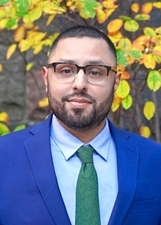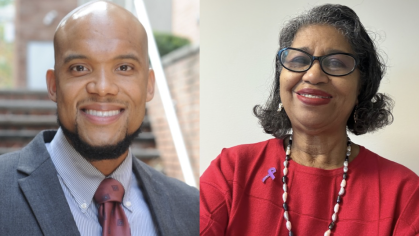
An interview with Dr. Gabriel Robles Alberto, Assistant Professor and Chancellor's Scholar for Inclusive Excellence in Sexual and Gender Minority Health, as told to MSW student Hannah Loffman
Q: Can you tell us about your journey to social work?
A: I completed my undergraduate degree in linguistics and was really interested in how people speak and learn languages. I was interested in learning French and Japanese—I wanted to conquer the world through travel and connect through language. I imagined myself as a teacher in Europe, Asia, or the U.S., teaching the English language to non-English speakers.
I started this kind of work at a YMCA family program and had high hopes. Once I started working with my students’ parents, my perspective changed, and I wanted to connect more with them after hearing their stories of mental health struggles and family violence. At that time, I still wasn’t thinking about social work and saw myself as becoming a school guidance counselor.
Things changed one day while I was working with one of our students at the YMCA. The student wasn’t feeling well and asked to spend their time in the office with me. I asked the student if they wanted to color or do some other kind of activity, but they asked specifically to play “princess,” so we did. This was so important—this student didn’t want to play outside with their peers, they wanted to play “princess” inside. It speaks to gender diversity and sexual identity, and it was something that a social worker would be more poised to support than a guidance counselor, so I knew then what I was meant to do.
Q: What brought you to Rutgers School of Social Work?
A: I started teaching part-time at Rutgers School of Social Work. I taught Clinical Assessment and Diagnosis, and it was delivered differently than how I knew it when working at NYU.
Q: The 2021 Transgender Day of Visibility is celebrated on March 31. Why is this day important to observe?
A: It’s about empowerment. It’s not only about seeing trans people as a community but also the implications and celebration of the accomplishments of transgender people. Pride started with transgender pride—specifically, the bravery of Black and Latina transgender people who were fighting not only for their own livelihood, but also for those across the spectrum.
Thinking of where things stand today, marriage equality stems from historical moments and action in places like New York City and San Francisco where transgender people were at the forefront fighting for their rights.
Q: What are some ways people can observe Transgender Day of Visibility?
A: It’s human nature to harp on tragedy. To share in the dismay and sorrow we feel when there is news that “another Black transgender woman died today.” There is good in this awareness, but we should also talk about the transgender people who are leading the way in popular, public spaces like in Hollywood and in politics.
State Senator Sarah McBride recently made history as the first and highest-ranking transgender elected official in Delaware. We need to know Sarah and other individuals making similar strides—their names should be commonplace! Instead of sharing the tragedies transgender people face, let’s highlight the positive side of transgender visibility and celebrate their accomplishments and how they impact our collective culture.
Q: What are some things the social work profession or social workers can do to increase awareness of the discrimination against transgender individuals?
A: First, and one thing that has been a great point of contention in recent months, is that the profession is not shielded from the racism, transphobia, or homophobia in the ways that we claim. It is rampant in our profession, and we need to do more work in calling it out and identifying it from within. I think about the teachings of subjects like diversity and oppression. We need to understand our own biases and privilege because it will impact our practice. This is something our entire profession must grapple with if we are supposed to be stewards of social justice.
Social workers also need to be reminded of why they entered the profession and how they can use their training to advance the rights of transgender individuals and other populations that they may not be in close contact with each day. Parallel conversations are happening in political communities. Rights have been advanced, but social issues are still present. The ways we teach and respond to these issues must adapt to the present needs of the marginalized populations we serve.
This story was created in partnership with Rutgers School of Social Work's Inclusion, Intersectionality, Diversity, Equity, and Advancement (IIDEA) Committee in support of our commitment to diversity, equity, and inclusion.



